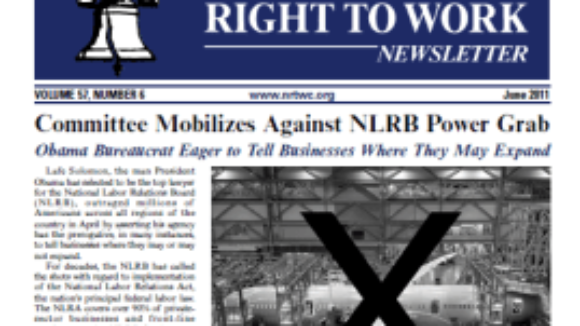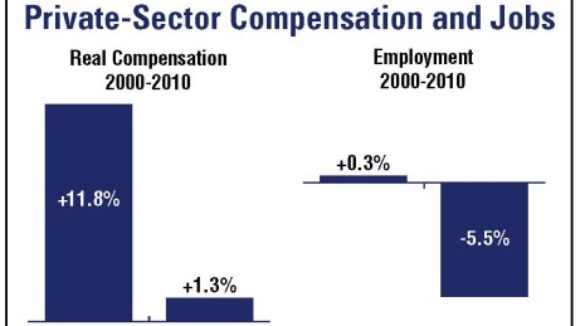June 2011 issue of The National Right To Work Committee Newsletter now available
The June 2011 issue of The National Right to Work Committee Newsletter is available for download in an Adobe pdf format for your convenience to read and share.

The June 2011 issue of The National Right to Work Committee Newsletter is available for download in an Adobe pdf format for your convenience to read and share.

By prohibiting compulsory union dues, state Right to Work laws spur the growth of private-sector employee compensation in the form of wages, salaries, benefits and bonuses, as well as employment growth. Sources: U.S. Commerce Department, U.S. Labor Department Private-Sector Compensation Growth Lags in Forced-Unionism States (Source: June 2011 NRTWC Newsletter) Even union bosses and their apologists sometimes grudgingly admit that long-term private-sector job growth in states that currently have Right to Work laws on the books far outpaces job growth in states that lack such pro-employee statutes. This fact is indeed hard to deny. From 1990 to 2010, according to the U.S. Labor Department, private-sector payrolls in Right to Work states soared by 32.0% -- an increase triple that of forced-union-dues states combined. Over the past decade alone, nationwide private-sector employment fell by 3.3% due to the impact of the severe 2008-2009 recession. But Right to Work states experienced an overall private-sector job increase, while forced-unionism states suffered a 5.5% aggregate job loss. Big Labor tries to downplay the significance of Right to Work states' large, persistent employment-growth advantage by suggesting that the jobs created outside of forced unionism's dominion are "the wrong kind." Unfortunately for union propagandists, however, U.S. Commerce Department data show that Right to Work states also enjoy a large, persistent advantage over forced-unionism states with regard to growth of private-sector employee compensation (including wages, salaries, bonuses and benefits). Real Compensation Grew Nine Times as Much Over Past Decade In Right to Work States
The Investor's Business Daily confirms that enacting Right to Work laws is a recipe for jobs and economic growth: The business world is abuzz over the National Labor Relations Board's complaint vs. Boeing's new South Carolina production line. For NLRB critics, the case boils down to one thing: "right-to-work" laws. Right-to-work states have generally lower unemployment, higher job growth, lower taxes and better business climates. They have growing populations and have been attracting businesses from other states. In most states, once a workplace is unionized, employees are required to join the union or they can't work there. But 22 states, including South Carolina, have passed laws that give employees the right not to join. Hence the term "right-to-work." Unions dislike these laws for the obvious reason: It reduces their membership.
From the National Right To Work Legal Defense Foundation press release: Public-sector union bosses file desperate lawsuit seeking to protect forced dues stranglehold over Wisconsin’s public workers and taxpayers Madison, WI (June 29, 2011) – With free legal assistance from the National Right to Work Foundation and the Wisconsin Institute for Law & Liberty, a Kenosha teacher affected by Wisconsin’s recent public-sector unionism reforms has filed an amicus curiae brief in federal court. Kristi Lacroix, who has been a teacher for 13 years and is an English teacher at the LakeView Technology Academy in Pleasant Prairie, filed the brief Monday in favor of the reforms which sharply limited government union officials’ monopoly bargaining power over public workers and taxpayers. Earlier this month, the Wisconsin Supreme Court upheld Governor Scott Walker’s government-sector monopoly bargaining reform bill, which protects the Right to Work for most government employees and bans automatic forced-union-dues seizures from public employees’ paychecks. In response, union lawyers filed a new lawsuit in federal court seeking to overturn the bill, claiming that Freedom of Association – the right of American citizens to voluntarily come together to express their opinions and petition the government – gives union bosses forced-dues and monopoly bargaining powers.
From BigGovernment.com: Virginia’s Former-Governor George Allen again rises to defend Right to Work and the principles of liberty embraced by our Founding Fathers against attacks from the Obama Administration and the acquiescent U.S. Senate. It is time for all freedom-loving…
From BigGovernment.com: Virginia’s Former-Governor George Allen again rises to defend Right to Work and the principles of liberty embraced by our Founding Fathers against attacks from the Obama Administration and the acquiescent U.S. Senate. It is time for all freedom-loving…
CNBC has rated Right to Work state Virginia as the best state to do business in America. The Governor credits the state’s Right to Work status as a key component to success. Governor…
The state of Louisiana proved it is serious about protecting taxpayer money on their construction projects when Gov. Bobby Jindal signed S.B. 76, a bill to prohibit government-mandated project labor agreements (PLAs). The bill protects taxpayers by ensuring that they…
The state of Louisiana proved it is serious about protecting taxpayer money on their construction projects when Gov. Bobby Jindal signed S.B. 76, a bill to prohibit government-mandated project labor agreements (PLAs). The bill protects taxpayers by ensuring that they…